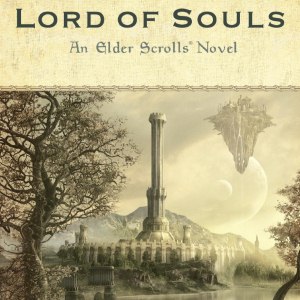
Having become mildly addicted to Skyrim lately (and by ‘mildly’ I mean ‘highly’) I was looking forward to reading Lord of Souls, a new novel set in the Elder Scrolls universe and focussing on the floating city of Umbriel. The Elder Scrolls games have never been small titles, priding themselves on huge explorable worlds and massive numbers of characters, which in game format have worked beautifully. But reading a book is a very different kettle of fish, and it’s often difficult to have a large number of characters without confusing matters, so could Greg Keyes defy the unlikely and deliver a smooth, enjoyable reading experience?
Well, sort of. Getting through the first few chapters if tough going. The opening especially isn’t the best and is likely to put off anyone without some fairly substantial stickability, and although it gets far more readable as the novel presses on, it’s a difficult start to what always threatens to be a complex book. But spend a bit of time learning the characters (and there’s a lot of them) and you’ll be rewarded with some very believable characterisations, although the storyline is spread quite thinly between them all which prevents you from ever developing a true connection to most of them.
The sheer number of characters also make life tricky when trying to remember who’s who, something made all the harder if you’re not normally a fantasy reader or missed out on the previous Elder Scrolls novel. Despite this you still end up with a clear sense of good and evil, and I often found myself wanting the best for the main characters as they ended up in a dangerous situation or action sequence. As for the bad guys they’re brilliantly portrayed, all sounded dangerous and fairly creepy; you’ll have no trouble coming up with your own mental image of them.
With such a focus on conversations in the Elder Scrolls games you’d have hoped to see some stirring dialogue, but this is an area that really could have been a lot better. It’s often a little clumsy and doesn’t feel genuine, certainly not matching the quality of the in-game dialogue we’ve come to love from Bethesda’s efforts. Instead it’s the battles themselves that take centre stage, offering some exciting and well crafted exchanges that make these particular sections quite enjoyable.
But the whole package just isn’t accessible enough to warrant recommending it to most people; it’s certainly not enough to have enjoyed the likes of Skyrim and Oblivion, you’ll need to serious stickability and memory skills to get the most out of Lord of Souls. It’s a shame, as there’s a huge scope for novels to embrace the series, but we’ll need something a bit different if they’re going to be appealing to a wider audience. It’s not terrible by any means, but it’s possibly just a bit heavy going for most.

Leave a Reply